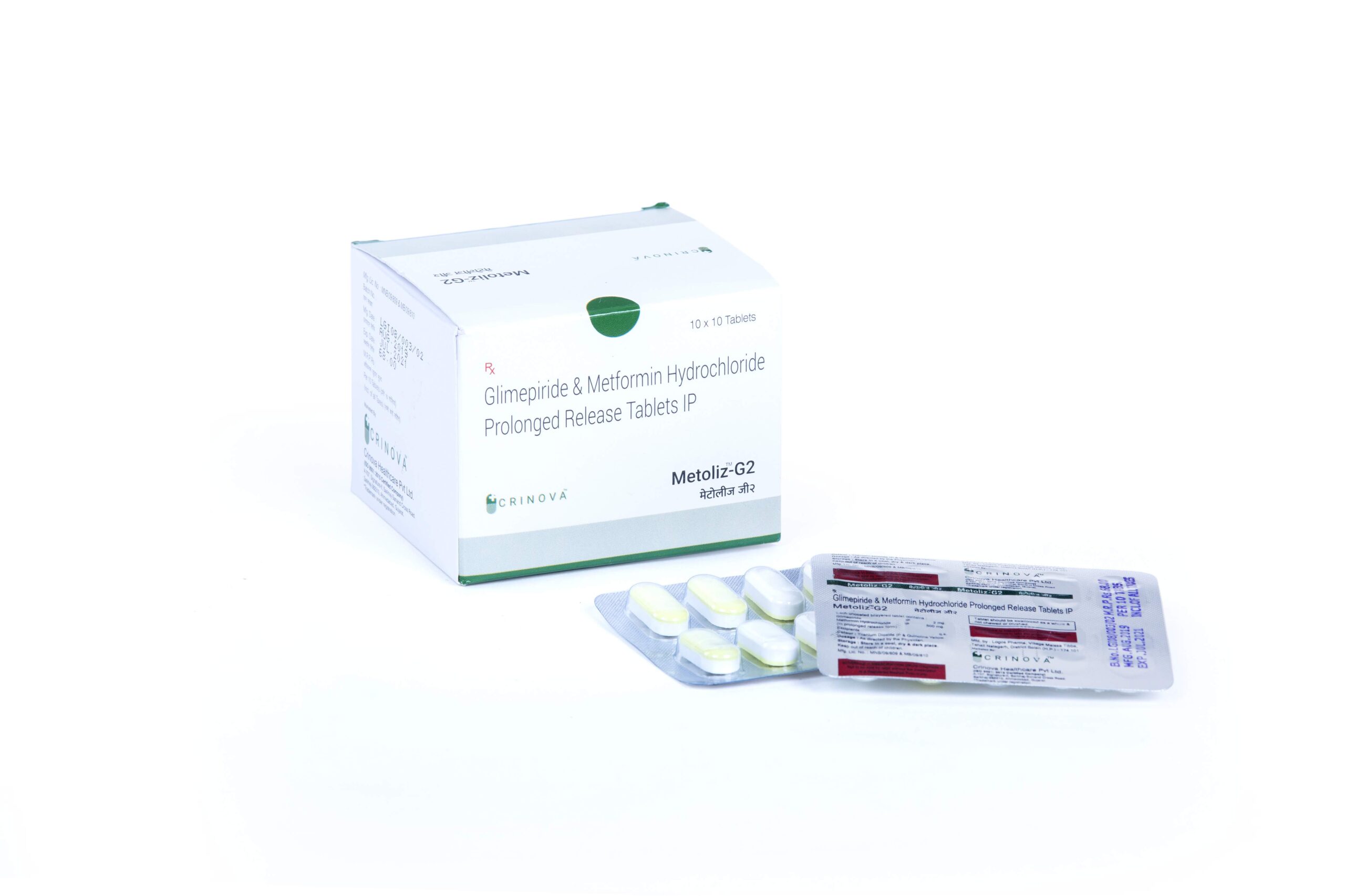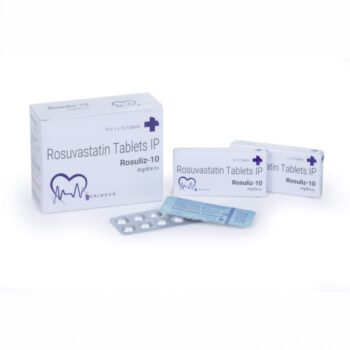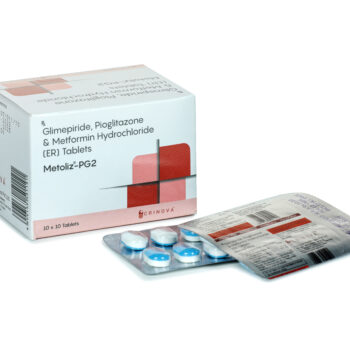Metoliz-G2
| Drug | : | Glimepiride 2 mg + Metformin 500 mg SR Bilayered Tablet |
| Packing | : | 10×10 Blister |
₹78.00
INTRODUCTION
Metoliz-G2 is a combination of Glimepiride and Metformin which belongs to a group of medicines called Antidiabetic agents. It is used to treat type II diabetes mellitus when diet, exercise and treatment with other single agents did not result in adequate response. Type II diabetes mellitus is a chronic medical condition in which the body cannot properly utilize the circulating sugars (glucose) from the blood to make energy. As a result, the patient experience sudden unintentional weight loss, extreme tiredness, increased urination, thirst or hunger and slow healing ulcers. If left untreated, it can cause permanent damage to the nerves in the body and may to lead to other life-threatening complications.
Glimepiride is a sulfonylurea which acts by making the pancreas secrete more insulin to digest the circulating glucose and metformin is biguanide which acts by blocking the production of glucose by the liver. Metoliz-G2 decrease blood glucose levels and makes the body respond better to insulin.
While taking Metoliz-G2, patients must continue to take carbohydrate-regularized diet as instructed by their doctor to obtain better results. Before taking Metoliz-G2 inform your doctor if you have type 1 diabetes mellitus, severe liver or kidney diseases, or heart problems. Metoliz-G2 is not recommended for use in pregnant and breastfeeding women. The common side effects of Metoliz-G2 are nausea, vomiting, diarrhea, stomach pain and changes in taste.
USES OF Metoliz-G2
- Treat type II diabetes mellitus when diet, exercise and other single agents does not provide adequate response
HOW Metoliz-G2 WORKS
Metoliz-G2 effectively reduces elevated blood glucose levels, where glimepiride acts by making the pancreas secrete more insulin to digest the circulating glucose and metformin acts by blocking the production of glucose by the liver. They collectively decrease the elevated blood glucose levels and makes the body respond better to insulin.
DIRECTIONS FOR USE
Take Metoliz-G2 as instructed by your doctor. Swallow it as whole and do not crush or chew it. Do not stop taking Metoliz-G2 unless your doctor tells you to stop.
SIDE EFFECTS OF Metoliz-G2
COMMON
- Nausea, vomiting
- Diarrhea, stomach pain, loss of appetite
- Changes in taste
RARE
- Low blood sugar levels
- Changes in blood counts (increased tendency to bleed, increased infections, weakness, pale skin)
Stop taking Metoliz-G2 and consult your doctor immediately, if you experience
- Signs of lactic acidosis (such as generalized weakness and tiredness, vomiting, stomach pain, muscle pain, difficulty in breathing, reduced body temperature and decreased heartbeat)
- Signs of dehydration (such as severe vomiting, diarrhea, fever,
exposure to heat) - Signs of liver problems (such as liver inflammation leading to yellowing of eyes and skin)
- Signs of allergic reaction (such as skin rash, itching, inflammation of blood vessels, difficulty in breathing, decrease in blood pressure, shock, increased sensitivity to sun)
- Severe hypoglycaemia which may cause unconsciousness, seizures, or coma
HOW TO MANAGE SIDE EFFECTS
Nausea and vomiting:
Try to take Metoliz-G2 with or just after a meal or a snack. Stick to simple meals. Avoid eating rich or spicy food. This side effect can be seen usually while taking Metoliz-G2 and would stop within two weeks of therapy. However, consult your doctor if they persist longer.
Diarrhea:
Drink lots of fluids, such as water or fruit juices to keep yourself hydrated. This side effect can be seen usually while taking Metoliz-G2 and would stop within two weeks of therapy. However, consult your doctor if they persist longer
Low blood sugar:
During signs of low blood sugar levels, immediately consume a meal or a snack which is rich in sugars like sweets, biscuits, or fruit juice. Follow the carbohydrate-regularized diet as instructed by your doctor to obtain better results. Consult your doctor if the signs of low blood sugar levels do not improve.
WARNING & PRECAUTIONS
PREGNANCY
Metoliz-G2 is generally not recommended for use in pregnant women. Consult your doctor before taking.
BREASTFEEDING
Metoliz-G2 is generally not recommended for use in breast feeding women. Consult your doctor before taking.
DRIVING AND USING MACHINES
Do not drive or operate any tools or machines if you experience signs of low blood sugar levels (like dizziness or fainting) while taking Metoliz-G2.
ALCOHOL
Avoid alcohol consumption while taking Metoliz-G2 as it could further increase blood glucose levels.
KIDNEY
Metoliz-G2 is not recommended for use in patients who have severe kidney impairment. Consult your doctor before taking.
LIVER
Metoliz-G2 is not recommended if you have severe liver disease. Consult your doctor before taking.
ALLERGY
Do not take Metoliz-G2 if you are allergic to Metformin, Glimepiride or other sulphonylureas (such as glibenclamide, gliclazide) or sulfonamides (Ex. sulphamethoxazole).
LUNGS
Metoliz-G2 is not recommended for use in patients having severe infection in the lungs or in the respiratory tract. Consult your doctor before taking.
OTHERS
Metoliz-G2 is not recommended for use if you:
- Have metabolic acidosis (buildup of acids or ketone bodies in the body which can cause sever weakness, dizziness, nausea, stomach pain, muscle pain which could be fatal)
- Have diabetic coma (high blood glucose levels causing unconsciousness)
- Have severe dehydration, severe infection, or shock
- Have uncontrollable diabetes or type I diabetes (insulin-dependent diabetes)
Before taking Metoliz-G2, inform your doctor if you:
- Recently had an injury, operation, fever with infections or under any other stressful condition
- Malnourished or not eating your meals properly (irregular mealtime or skipped meals)
- Recently made changes in your diet
- Have hormonal imbalance (Ex. thyroid disorders)
- Are doing high intensity exercises without proper energy-rich nutrient diet
- Are scheduled for a surgery
Use in Pediatrics:
- Metoliz-G2 is generally not recommended for use in children and adolescents under 18 years of age. Kindly consult your doctor before taking.
Use in Geriatrics:
- Metoliz-G2 should be used with caution in elderly patients. Kindly consult your doctor before taking.
INTERACTIONS
- Drug – Drug interactions:
Before taking Metoliz-G2, inform your doctor if you are taking,
- Medicines used to treat pain and inflammation (such as aspirin, ibuproefen, celecoxib, oxyphenbutazone, phenylbutazone, azopropazone)
- Other medicines used to treat diabetes (such as insulin, glyburide)
- Anabolics (used to increase muscle buildup) Ex. nandrolone, oxymetholone
- Medicines used for blood thinning (Ex. warfarin)
- Fenfluramine (used to treat obesity)
- Medicines used to heart problems (Ex. captopril, enalapril, propranolol, disopyramide, methyldopa, clonidine, reserpine, diazoxide)
- Diuretics (used to increase urine output) Ex. hydrochlorothiazide, furosemide
- Medicines used to treat high blood cholesterol levels (Ex. clofibrate, fenofibrate, nicotinic acid, colesevalam)
- Medicines used to treat depression (such as isocarboxazid, phenelzine, selegiline, tranylcypromine, fluoxetine, citalopram).
- Medicines used to treat gout (Ex. allopurinol, probenecid, sulfinpyrazone)
- Medicines used to treat certain forms of cancer (Ex. crizotinib, olaparib trofosfamide, cyclophosphamide, ifosfamide)
- Medicines to treat bacterial infections (Ex. doxycycline, chloramphenicol, azithromycin, erythromycin, clarithromycin)
- Fluconazole, isavuconazole, miconazole (used to treat fungal infections)
- Tritoqualine (used to treat nasal congestion caused due to allergic reactions)
- Pentoxifylline (used to treat circulatory disorders)
- Medicines used to treat urinary tract infections (Ex. cotrimoxazole)
- Testosterone (used to regulate male hormone in the body)
- Estrogen and progesterone containing medicines (used to regulate female hormones in the body)
- Levothyroxine (used to treat thyroid deficiency)
- Corticosteroids (used to treat pain and inflammation) Ex. prednisolone, dexamethasone, betamethasone
- Medicines used to treat mental illness (Ex. chlorpromazine, mesoridazine, fluphenazine)
- Medicines that have stimulatory effects in the body (Ex. adrenaline, amphetamine)
- Medicines to treat constipation (Ex. lactulose)
- Phenytoin (used to treat epilepsy)
- Glucagon (used to treat severe low blood sugar levels)
- Barbiturates (used to induce sleep) Ex. phenobarbital
- Rifampicin (used to treat tuberculosis)
- Acetazolamide (used to treat glaucoma)
- Ranitidine, cimetidine (used to treat stomach ulcers)
- Injection of contrast medium (used for diagnostic purpose)
- Dolutegravir (used to treat viral infections)
- Ranolazine (used to treat chest pain)
- Vandetanib (used to treat tumors of thyroid gland)
Overdosage:
If you or anyone else accidentally take too much of Metoliz-G2, consult your doctor immediately. Overdose may cause signs of lactic acidosis (such as generalized weakness and tiredness, vomiting, stomach pain, muscle pain, difficulty in breathing, reduced body temperature and decreased heartbeat).
SYNOPSIS
| Drug | : | Glimepiride, Metformin |
| Pharmacological Category | : | Sulfonylurea, Biguanide |
| Therapeutic Indication | : | Type II diabetes mellitus |
| Dosage Forms | : | Tablet |
MORE INFORMATION
- Keep Metoliz-G2 out of reach of children.
- Store Metoliz-G2 at room temperature.
FAQs ABOUT Metoliz-G2
Can I consume alcohol while taking Metoliz-G2?
No. Do not consume alcohol while taking Metoliz-G2 as it can increase your blood sugar levels further.
Can Metoliz-G2 cause vitamin B12 deficiency?
Yes. The use of Metoliz-G2 can cause alternation in blood count. It can cause decrease in number of red blood cells making your skin look pallor and can make you feel tired and weak. Consult your doctor if you experience any of these symptoms.
What are the precautions do I need to follow while taking Metoliz-G2?
Before taking Metoliz-G2 inform your doctor if you are pregnant or breastfeeding or if you have type I diabetes or any other conditions affecting your liver, kidney, or heart function. Inform your doctor if you have any signs of infections. Make sure to drink plenty of fluids to avoid dehydration and urinary infections. While taking Metoliz-G2, always carry a sugary snack or meal with you, so that it can help you to cope up sudden episodes of dizziness or fainting caused due to low blood sugar levels. Regularly monitor your blood glucose levels and kidney functions as instructed by your doctor without fail.
Can I stop taking Metoliz-G2 once my symptoms are relieved?
No, do not stop taking Metoliz-G2 without consulting your doctor. Continue to take Metoliz-G2 as instructed by your doctor to obtain better results.
What are the possible side effects of Metoliz-G2?
Metoliz-G2 can cause nausea, vomiting, diarrhea, stomach pain and changes in taste sensation. However, these side effects are usually temporary and gets resolved within two weeks of time. If they persist for longer period, contact your doctor.



